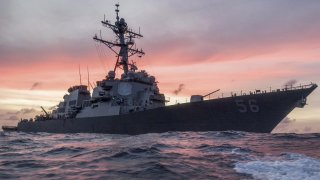The Chinese Spring Offensives of 2020
Regaining every inch of ground once ruled by imperial China is central to the dream President Xi Jinping exhorts Chinese to embrace. Miss an opportunity and China’s dream might never come true. And where would that leave Chinese Communist rulers, who already face a sullen populace? Is now the time Beijing may decide to strike—thanks to COVID-19?
There’s also strategic logic to making an effort on all fronts at the same time. The classical Chinese general Sun Tzu, whose writings are central to China’s way of war, counseled commanders to open direct and indirect axes of attack. Pursuing multiple lines of operation kept enemies off-balance, wondering whether the major blow would fall. Furthermore, Sun Tzu advises commanders to shift the emphasis back and forth between direct and indirect operations, putting more effort into whichever delivers better results at the time. The indirect could become the direct, the direct could become the indirect, and back again. Which axis of attack predominates could fluctuate over the course of a campaign.
Sun Tzu’s supple approach appears ideal for China’s 2020 spring offensives should it undertake them. It would put the allies on the horns of a dilemma. The coast guard and maritime militia might step up their endeavors to enforce control of disputed South or East China Sea water space, distracting Asian and Western attention while the PLA aimed its main blow at Taiwan. If rebuffed in the Taiwan Strait, Chinese forces might nonetheless make substantial gains in the secondary theaters—and help Xi make good on his promises. Contrariwise, the PLA might menace Taiwan to siphon allied attention and resources away from the northerly and southerly contested zones. Then, if the allies took the bait and surged to the Strait, opportunity would beckon in the East and South China seas.
In short, spreading the field from north to south opens strategic vistas for PLA commanders. If Xi chose to play it safe, for instance, the PLA, coast guard, and militia might feint toward all of the major objectives at the same time, stretching allied defenses, yet settle for some choice but limited geographic position. To name one, PLA amphibious forces might deprive Taiwan of Taiping Island, Taipei’s forward outpost in the South China Sea. Suitably upgraded, Taiping would make a worthy addition to China’s constellation of air and sea bases in Southeast Asia. Incremental gains might suffice for Xi Jinping’s purposes.
Options abound.
Now, there are known unknowns in all of this. For one, PLA officialdom has remained determinedly closemouthed about how badly the coronavirus debilitated PLA forces. Disease exempts no one. Beijing claims to have a handle on the public-health situation, but figures out of Beijing are worth what you pay for them. Intelligence services should keep an eye on the PLA Navy, Air Force, and Rocket Force in particular. These are the arms that would perform most of the heavy lifting vis-à-vis Taiwan while providing fire support for offensives to the north and south. China’s options are limited if pestilence has idled a substantial share of PLA air, missile, and sea forces.
For another, the character of Xi Jinping is pivotal. He’s the decider. He has never struck me as a gambler by nature. But past aggressors have surveyed their surroundings, caught sight of a fleeting chance, and tossed the dice. Even Chancellor Otto von Bismarck—a statesman much admired in Communist China for his self-restraint and diplomatic dexterity—staged three limited wars to unify Germany in the 1860s and 1870s. If Xi believes things are as promising today as they will be and that he can get his way without fighting—or with minimal fighting—he might gamble as well.
Aggressors love peace, as Clausewitz and Sun Tzu teach. Aggressors hope to get their way without the hazards, costs, and uncertainties endemic to war. Like Bismarck, Xi may be no exception to this rule. So take it from the masters of statecraft, Western and Eastern alike. Let’s stay on guard during the coming weeks—no matter how bleak things get because of the pandemic.
James Holmes is J. C. Wylie Chair of Maritime Strategy at the Naval War College and the author, most recently, of A Brief Guide to Maritime Strategy. The views voiced here are his alone.
Image: Reuters

